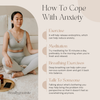
Effective Methods of Coping with Anxiety
, by Paul Walker, 4 min reading time

, by Paul Walker, 4 min reading time
Anxiety, a natural response to stress, can range from occasional worry to chronic disorders that significantly impact daily life. While professional intervention is vital for severe cases, many effective self-help strategies and therapeutic methods can alleviate symptoms and foster resilience. Here, we explore various approaches to coping with anxiety.
Before managing anxiety, it’s essential to understand its root causes and manifestations. Anxiety may arise due to genetic predispositions, environmental stressors, or an overactive fight-or-flight response. Symptoms include excessive worry, restlessness, rapid heart rate, and difficulty concentrating.
Making adjustments to daily habits can significantly reduce anxiety levels over time. Some recommended lifestyle changes include:
Regular Exercise: Physical activity, such as jogging, yoga, or swimming, reduces stress hormones like cortisol and increases endorphin levels, promoting feelings of well-being.
Healthy Diet: Consuming a balanced diet rich in omega-3 fatty acids, whole grains, fruits, and vegetables can support brain health and stabilize mood.
Adequate Sleep: Maintaining a regular sleep schedule and creating a calming bedtime routine can help regulate emotions and improve resilience to stress.
Mindfulness practices and relaxation exercises can significantly reduce symptoms of anxiety by calming the nervous system.
Mindfulness Meditation: Focusing on the present moment through guided meditations can interrupt negative thought cycles.
Deep Breathing Exercises: Techniques like diaphragmatic breathing promote relaxation and decrease physical symptoms of anxiety.
Progressive Muscle Relaxation (PMR): Systematically tensing and relaxing muscle groups can reduce overall physical tension.
CBT is one of the most effective therapeutic approaches to managing anxiety. It involves identifying and challenging irrational thoughts that contribute to anxiety and replacing them with constructive, rational thinking patterns. Working with a trained therapist can maximize the benefits of CBT.
Creating a set of coping strategies can help manage anxiety when it arises:
Journaling: Writing down thoughts and feelings provides an outlet for pent-up emotions and can reveal patterns contributing to anxiety.
Limiting Stimulants: Reducing caffeine, nicotine, and alcohol consumption can prevent these substances from exacerbating anxiety symptoms.
Engaging in Hobbies: Activities such as painting, reading, or gardening can shift focus away from anxious thoughts.
Connecting with friends, family, or support groups can provide a sense of belonging and reduce feelings of isolation. Sharing concerns with trusted individuals often alleviates emotional burdens.
Being kind to oneself is crucial in managing anxiety. Recognize that anxiety is a common human experience and avoid self-judgment. Celebrate small victories and take pride in efforts to address the condition.
For persistent or debilitating anxiety, consulting a mental health professional is essential. Therapists may recommend:
Psychotherapy: Approaches such as CBT or exposure therapy.
Medication: Anti-anxiety medications or antidepressants may be prescribed in severe cases.
Specialized Treatments: Techniques like biofeedback or Eye Movement Desensitization and Reprocessing (EMDR) may be appropriate for some individuals.
During acute anxiety episodes, immediate strategies can provide relief:
Grounding Techniques: Engage the five senses to reconnect with the present moment. For example, identify five things you can see, four you can touch, three you can hear, two you can smell, and one you can taste.
Box Breathing: Inhale for four counts, hold the breath for four counts, exhale for four counts, and pause for four counts before repeating.
Positive Affirmations: Repeating phrases like “This feeling is temporary” can promote calmness.
Managing anxiety is a journey that requires patience and persistence. By combining lifestyle changes, therapeutic approaches, and healthy coping mechanisms, individuals can build resilience and improve their quality of life. For those struggling to find relief, professional support can provide tailored guidance and solutions. Remember, seeking help is a strength, not a weakness.